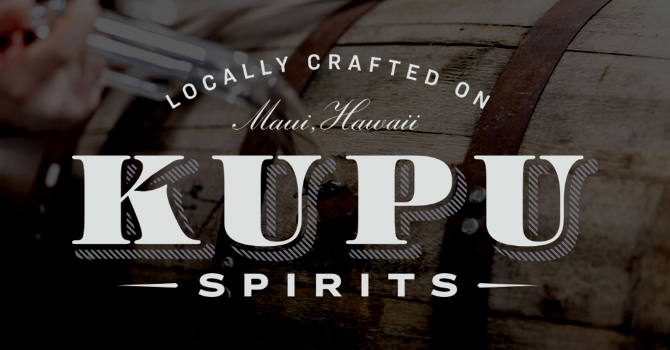
Maui Brewing Company is rolling out a line of ready-to-drink canned cocktails and hard seltzers in hopes of offering a local alternative to products being shipped to Hawaii from the mainland, co-founder and CEO Garrett Marrero told Brewbound.
The new lines, which will initially be sold only in Hawaii, offer Maui “an avenue for growth” as competition increases, he added.
In late June, Maui launched a line of canned cocktails under the Kupu Spirits banner. The “Maui” name had already been taken by a spirits company, so the company chose “kupu,” which in the Hawaiian language means “to sprout” or “to grow.”
Kupu rolled out with three offerings — Whiskey Cola, Whiskey Ginger and Gin & Tonic — with a fourth SKU (vodka soda) on the way. The current offerings each check in at about 7% ABV and blend Kupu’s whiskey and gin with Maui’s existing non-alcoholic Island Soda line.
“The Idea is integrating things that we make together into a new product line,” Marrero said. “We’ve made the sodas forever; this is just an extension of that.”
Kupu’s canned cocktails are sold in 4-packs and single-serve cans and are priced similar to products from Cutwater Spirits (around $12.95 per 4-pack), the San Diego-based craft distilling venture that was acquired by Anheuser-Busch InBev in February.

Marrero said the goal for Kupu is to sell as much as 20,000 case equivalents over the first 12 months, with its list of retailers including Whole Foods, Safeway, Foodland and Tamura’s on the Hawaiian islands. The company’s four restaurant locations across Maui and Oahu also offer the product.
Maui’s initial focus for Kupu is to build the brand in Hawaii, with potential distribution expansion to the West Coast and exporting to Japan starting in the third quarter of 2020, Marrero said.
The company’s interest in spirits dates back to 2010, Marrero said, was unable to act on those interests due to state regulations that blocked beer, wine and spirits producers from making more than a single type of alcoholic beverage.
“We had a lot of legal hurdles to overcome before we could even able to start distilling or to even consider doing a ready-to-drink cocktail,” he said.
Those changes came in 2013 but were implemented over several years, Marrero said. Maui finally began plotting the launch of its distilling operation in 2017. Marrero estimated that the company has committed about $750,000 to the project.
Maui’s entry into canned cocktails comes as other craft breweries — Rogue Ales & Spirits and Boulevard Brewing Company (Fling) and former A-B craft division executive Felipe Szpigel (Five Drinks Co. — have entered the fast-growing canned cocktail market. Off-premise retail sales of prepared cocktails in cans increased 70.3 percent, to $55.3 million, during the 52-week period ending July 13, according to market research firm Nielsen.

Meanwhile, Maui is also entering the growing hard seltzer space, which Nielsen projects to be a $1 billion industry by the end of 2019.
Maui plans to test market six flavors of “Maui Hard Seltzer” in its taprooms before the end of the year, Marrero said. The hard seltzer line is expected to check in at about 4.5% to 5% ABV, and is gluten-free and unsweetened.
Marrero said Maui’s hard seltzers won’t lean on typical flavors black cherry or lime. Instead, the brand’s flavors will be more tropical, with guava, POG (passion fruit, orange and guava) watermelon, and mango, among others.
The moves come as Maui core beer business continues its upward trajectory. Last year, the company’s 3-year streak of double-digit volume growth ended, but the company still increased production 3%, to 56,723 barrels, according to trade group the Brewers Association.
Marrero told Brewbound that Maui’s beer sales in Hawaii increased about 11 percent last year, although sales off the islands were either flat or up slightly, which he attributed to the more than 7,500 breweries “flooding the market with new beer.”
Despite more growth on tap this year, Marrero is concerned about maintaining the company’s margins.
“On the beer side, we’ll hit 60,000 barrels this year, and that’s that magic number for taxes,” he said, referring to the excise tax relief achieved in the Tax Cuts & Jobs Act of 2017, which cut the federal excise tax from $7 per barrel to $3.50 per barrel on the first 60,000 barrels for domestic brewers producing fewer than 2 million barrels annually. “Anything above that, the margin per barrel goes down significantly.”
After hitting the 60,000-barrel mark, Marrero said Maui will look to pull more business back to Hawaii, retrenching from faraway markets (likely starting on the East Coast) in order to maintain its margins.
“I’d say in the next year some changes will be made, especially after we hit that 60,” he said.
